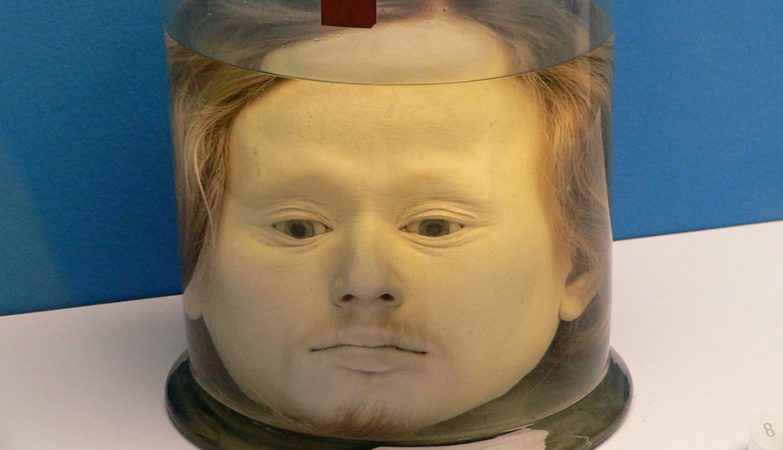 The first thing you’ll notice upon entering the anatomical theatre at the University of Lisbon’s Faculty of Medicine is the lone pickled head, up on a shelf next to a diaphonized hand. It’s yellow, peaceful-looking, and somewhat akin to a potato.
The first thing you’ll notice upon entering the anatomical theatre at the University of Lisbon’s Faculty of Medicine is the lone pickled head, up on a shelf next to a diaphonized hand. It’s yellow, peaceful-looking, and somewhat akin to a potato.
The various physicians and anatomy technicians in the preceding hallway all address it with a mix of familiarity and indifference. It’s just there, really. Just the head of Diogo Alves, whose claims to fame include being both Portugal’s first serial killer and the last man to be hanged.
At least one half of each claim is true. Diogo Alves was born in Galicia in 1810 and traveled to Lisbon early in his life, to serve in the houses of the well-to-do of the Portuguese capital. This southwards migration was common to plenty of Galicians looking for work, but Alves soon realized a life of crime would be more profitable. (History often blames an opportunistic barmaid for this shift in morality, because what’s a story without a temptress?) From 1836 to 1839, he transferred his workplace to the Aqueduto das Águas Livres (Aqueduct of the Free Waters).
Nearly one kilometer (0.62 miles) long, the Aqueduto spanned the Alcântara valley, allowing both water and suburbanites to make their way into the city, 213 feet above the rural landscape.

The Aqueduto das Águas Livres, Lisbon, where Alves committed his crimes.
Many of these commuters were humble farmers traveling to the city to sell their produce, a fact Alves was privy to. He would await them on their return by nightfall, divest them of their gains by whatever means possible, and unceremoniously push them to their deaths. He repeated this sequence 70 times in the three years he was active in the Aqueduto, and it’s unclear why he stopped. Police intervention was hardly a factor, as the deaths were dismissed as a wave of suicides—it’s not like anyone in power would have feared a murderer who targeted only the poor.
Having retired from the Aqueduto, Alves set his sights on flightier targets, formed a gang, and started targeting private residences. Eventually, after breaking into a physician’s house and murdering the people inside, he was caught by the authorities and sentenced to hang in February 1841.
This is where the facts of Alves’ story often go astray. He was not the last man to be executed—at least six more followed him to the gallows between 1842 and 1845. Portugal would eventually rule out capital punishment in 1867. And there is yet more to debunk. Alves was a serial killer, indeed, but not the first. The title falls to Luísa de Jesus, a Coimbra resident who confessed to the murder of 28 newborns taken from the local foundling wheel. She was hanged in 1772, the last ever woman to be executed in the country. As someone whose criminal career began and ended with a national milestone, Luísa de Jesus is the person Diogo Alves would have been, had his claims to fame held out. So why is his head the one on display?
Alves was executed in 1841, as phrenology was just beginning to rear its ugly head in Portugal. We recognize phrenology, the discipline developed by German physician Franz Joseph Gall in the 1700s, as a pseudoscience today, but back then its premises were simple and its conclusions downright revolutionary: the brain housed all aspects of an individual’s personality in physically distinct areas, and the shape of the skull reflected this internal organization. Personality traits, criminal propensity included, could be felt, palpated and measured right on the individual’s skull. It is no surprise, then, that a notoriously wicked corpse would draw the attention of Portugal’s budding band of phrenologists—who requested Alves’ head be severed and preserved for posterity, so the source of his criminal urges could be studied in depth.
There is little evidence that such a study of Alves’ personality ever took place in the University, though similar ones did. The skull of Francisco Mattos Lobo, a contemporary of his who butchered a family of four and defenestrated their dog, was examined by phrenologists in April 1842 and rests just two doors down the hallway, in a glass case of patinaed skulls, that, it seems, do not get nearly as many visits as Alves himself.




























Comments
In São Tomé in the early 1900s, Portugal used a thinly disguised form of slavery called indentured labour, almost exactly as Britain did in the South African mines at the same time. And forced labour was common in both Angola and Mozambique right up to the 1960s. British companies in Mozambique also used forced labour to make a profit, right up to 1942.
As from 1867, capital punishment was no longer on the statute book; Historyman clearly refers to state sponsored assassinations, which sadly are still with us worldwide. But I do not know of any in Portugal after 1974.
Given the activities of Salazar's PIDE Secret Police over the decades in the last century and huge numbers missing or found dead following apparent arrest by them - one the Great Uncle of Ms Martins the current leader of the Left Block; it cannot be claimed that state executions ended when "Portugal eventually ruled out capital punishment in 1867"
It is like the astonishing Portuguese claims to have ended slavery late in the 1700's, before even us British became concerned, yet slavery by the Portuguese is now known to have been still active in the 1900's. One justification at the time by us British in Pink Map times for not letting the Portuguese have what became Rhodesia (later Zimbabwe).